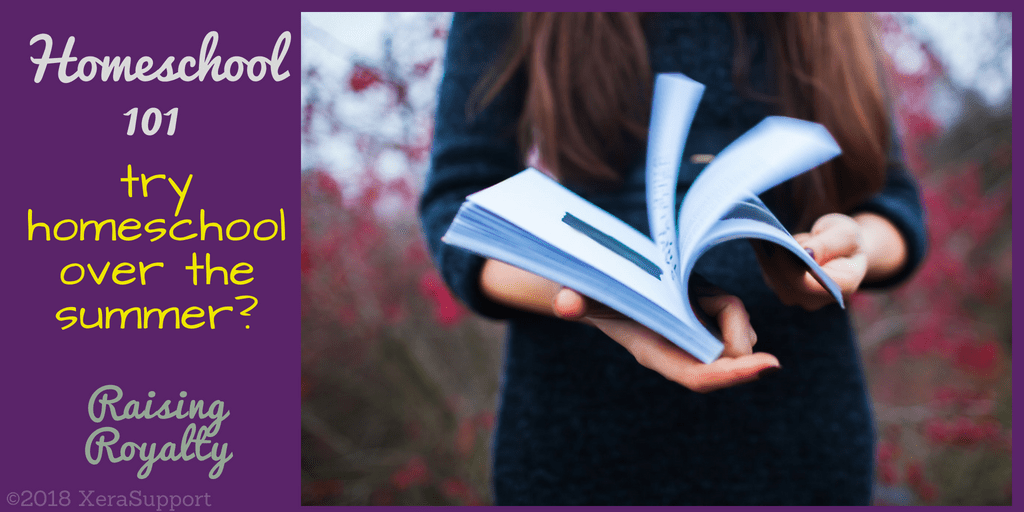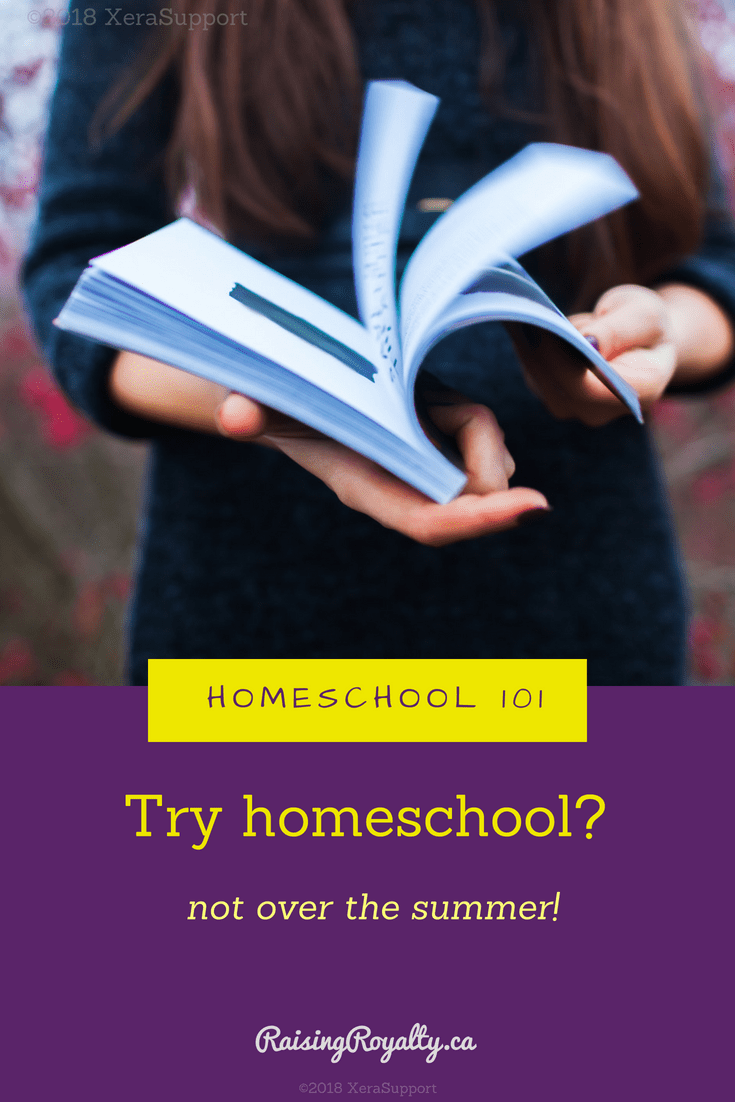“We’re going to try homeschooling over the summer.”
I often get this from parents thinking of homeschooling their kids. They aren’t quite ready to pull their kids out of the public school system, so they wait till school is over. Then they want to “try” homeschooling.
On the surface, it makes sense. The kids are out of school, and they’re home all day with you. Why not take advantage of the time? Even if you decide homeschooling isn’t for you, the kids will have spend their time in “educational activities” and not “wasted it”. So they should be ahead if (and when) they do go back. Right?
“Trying” homeschooling doesn’t work.
Homeschooling is a lifestyle choice, not an educational alternative.
It’s not just a different way to educate. It’s a whole-family, whole-life change in how you live. If you are merely trying it out, you aren’t fully committed to homeschooling, and you won’t really give it a fair chance. You’ll try to homeschool without changing anything else about your life. And it won’t work.
In order to homeschool, you have to be willing to be different. You aren’t a trained public school teacher, and re-creating a school classroom in your home is probably beyond your budget — and your needs. Most public school educating methods are dependent on lots of kids being in the classroom, and you’re only going to have a few.
Your child needs a break.
They just spent a good portion of their life in a restrictive, demanding environment. They need a vacation! For you to expect them to want to sit and do school work all summer long, when the weather is nice and all their friends are outside playing, is probably unrealistic.
You’re going to get a lot of resistance.
You’ll get probably more resistance than if you had pulled your child out of school during the school year to homeschool. Not only are your children stressed from school — especially if they had a difficult year — but they are going to be upset that they aren’t getting the vacation they have been looking forward to for months.
You may find that your child is more argumentative, more whiny, and more easily upset than typical. They may fight with you and their siblings more often. And you may find yourself losing your cool more often!
Then you’ll throw your hands up and tell yourself that this homeschooling idea just doesn’t work for you. And you’ll put them back in school.
It’s not that homeschooling doesn’t work for you. “Trying” homeschooling during the summer doesn’t work for almost anyone.
Rather than “trying” homeschooling, take the summer to learn about homeschooling. Study your kids while they play, relax, and explore. Consider your family’s lifestyle and think about what you like about it. How would having your children at home enhance it or change it? And determine your reasons for wanting to homeschool. Are you concerned about their safety at school or what they are learning outside the classroom? Or are you more worried that they aren’t learning well or at all in the classroom? Or something else?
Once it’s time for public school to start, keep them out for a few months.
It won’t hurt them to stay out for September — it’s all review anyway. But don’t start school-like activities yet. Live with the change in family dynamics for a bit, until you’re all adjusted to the new normal. You may see some behaviour or attitudes that needs parental attention, and this is when you want to address that — before you start homeschooling.
In your second month out, you will start to see a rhythm happening. And you should see your children’s natural curiosity begin to come out. They may start asking you questions. This is when you want to help them find the answers. Look up videos on YouTube. Find relevant articles on Wikipedia. Borrow books from the library. Maybe even find experts in your area that can answer the questions for them. For example, if your son starts asking questions about why the leaves turn colors in the fall, try connecting with a greenhouse owner or horticulturalist and let your son ask them his questions.
Are you ready for more?
In your third month, if you’re feeling the need to become more structured in your learning, this is when you would start with low-key items. It’s fine if you are comfortable and happy with your children’s love of learning leading the way.
But if you are looking to add in something, start with read-alouds. Your local library will be an excellent resource for this. Encourage your children to pick books that interest them (not necessarily at a specific “reading level”) and then pick out books that you can read out loud to them. Or, if you prefer, audio books are also a good choice.
Then schedule a time every day to sit down and read. Have your children read out loud to you. Discuss what they are reading with them. Ask them what they like and what they think will happen next. Help them sound out words, or pronounce difficult vocabulary words correctly. Next, read out loud to them, or play your chosen audio book. Give your kids drawing paper or coloring books to color while they’re listening. Or, if you have more active kids, try lego or building blocks. Let them play but encourage them to stay quiet so they can listen to the story.
Now you’ll know if it works for you.
At Christmas time, re-evaluate your homeschooling. Are you ready to add in more structure? Or is your family hating this and ready to go back to public school? Either way, now you’ll have given it a real trial, and you’ll know for sure whether or not homeschooling is for you.
[mailerlite_form form_id=2]


